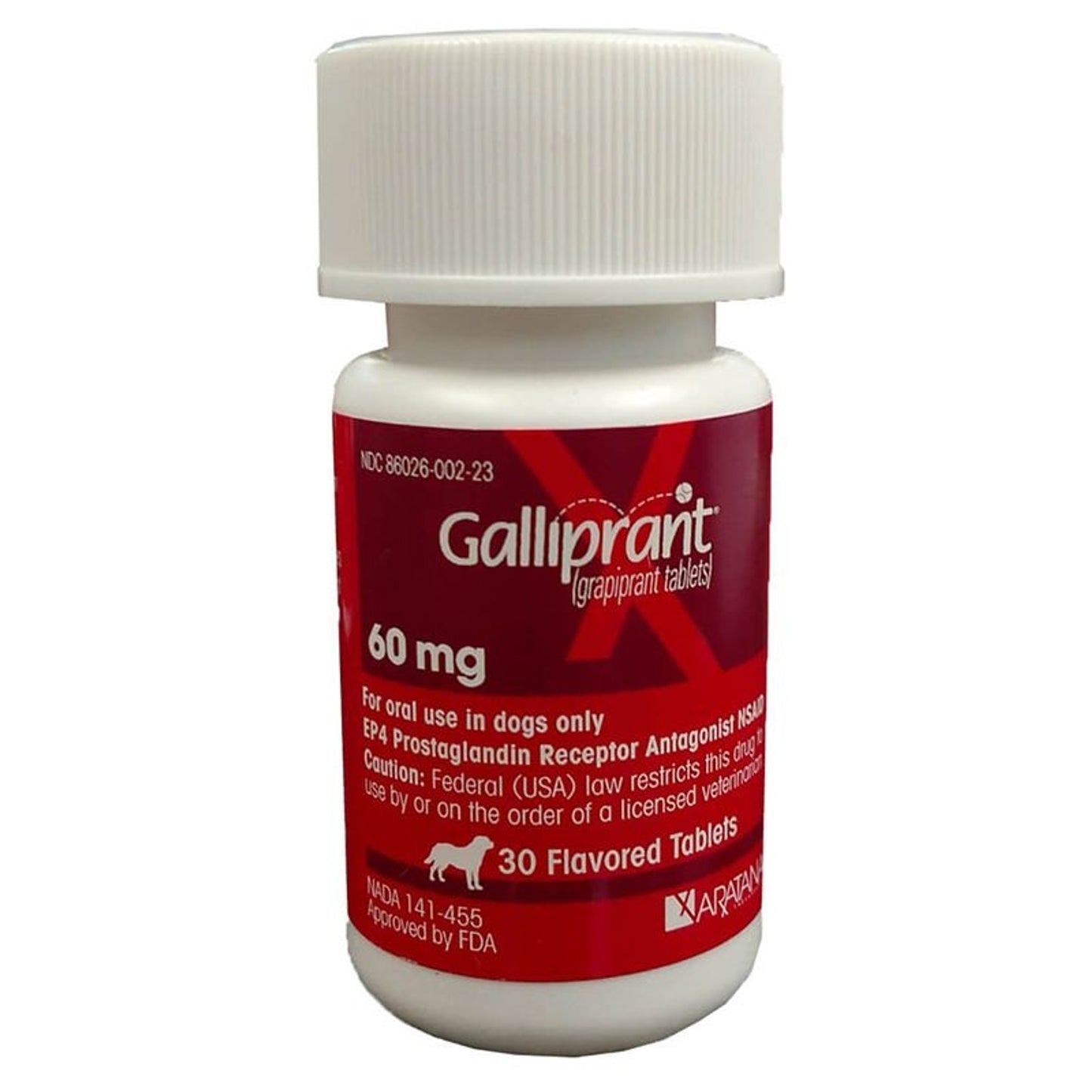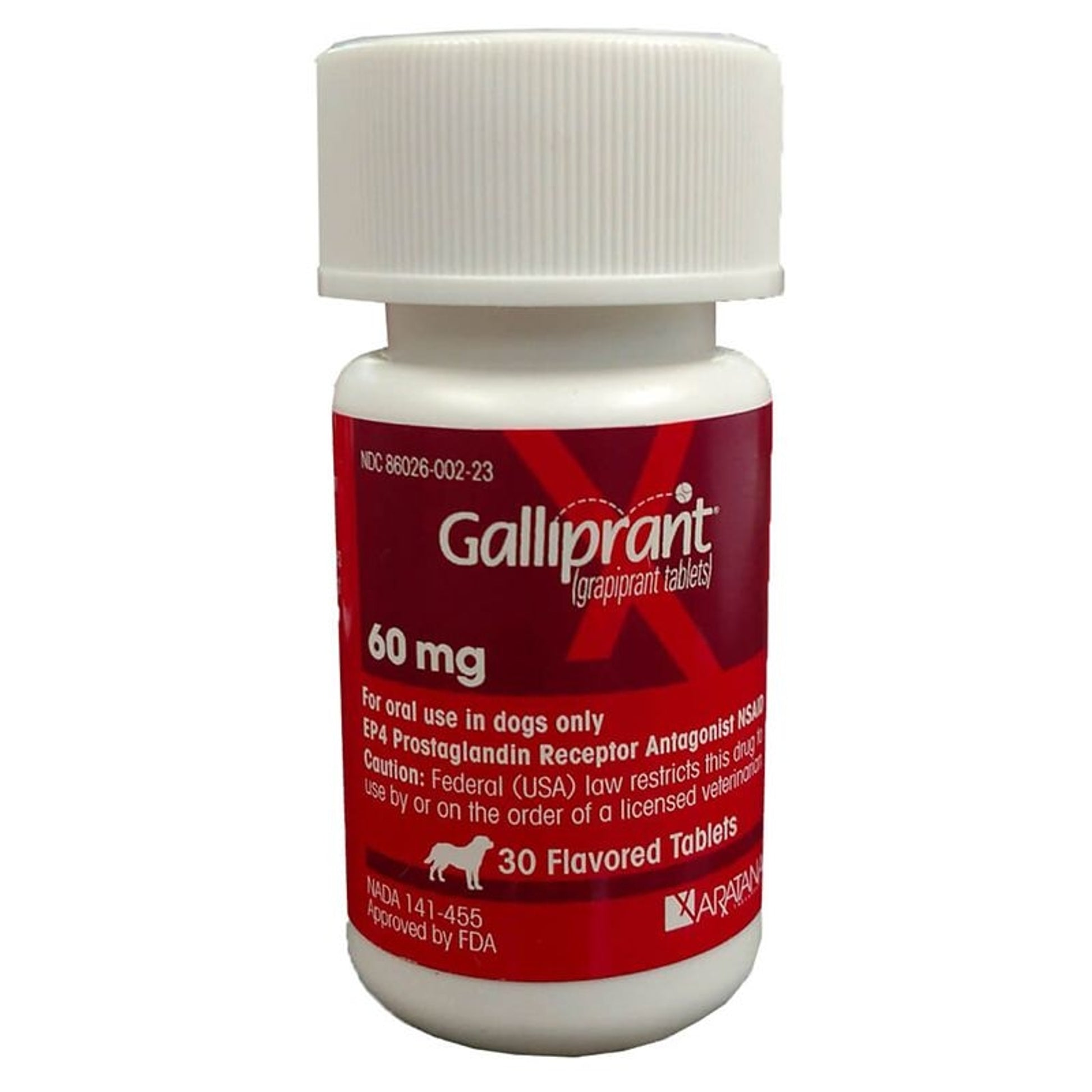Galliprant
Galliprant Tablet
Galliprant Tablet
Couldn't load pickup availability
SKU:PX101054 060 030
Galliprant Tablets
Galliprant (Grapiprant) Tablets are used for the control of pain and inflammation associated with osteoarthritis in dogs. Galliprant is a new class of anti-inflammatory that targets pain, so your dog can get pain relief from the earliest diagnosed stages of osteoarthritis.
For:
Dogs (9+ months of age, weighing 8+ lbs)
Benefits:
- For the treatment of pain and inflammation associated with canine osteoarthritis
- Safe and effective for dogs as young as 9 months, weighing at least 8 lbs
- Targets canine OA pain and inflammation while reducing the impact on GI, kidney, and liver homeostasis
- Pork liver-flavored, scored tablets make administration easy
-
Helps dogs with osteoarthritis remain active and pain-free
Brand Name:
Galliprant (grapiprant tablets) (Aratana)
Generic Name:
Grapiprant
Galliprant (grapiprant tablets) is used in dogs for the treatment of pain and inflammation from osteoarthritis (OA). It is a first-in-class non-COX-inhibiting prostaglandin receptor antagonist. Galliprant (grapiprant tablets) is prescription (RX) medication. It is available in 20 mg, 60 mg, and 100 mg strength tablets. The safe use of Galliprant (grapiprant tablets) has not been evaluated in dogs younger than 9 months of age and less than 8 lbs in weight, dogs used for breeding, or in pregnant or lactating dogs. Galliprant (grapiprant tablets) should not be used in dogs that have a hypersensitivity to grapiprant. If Galliprant (grapiprant tablets) is used long term, appropriate monitoring is recommended. Concurrent use with other anti-inflammatory drugs has not been studied. Concomitant use of Galliprant (grapiprant tablets) with other anti-inflammatory drugs, such as COX-inhibiting NSAIDs or corticosteroids, should be avoided. If additional pain medication is needed after a daily dose of Galliprant (grapiprant tablets), a non-NSAID/non-corticosteroid class of analgesic may be necessary. Concomitant use of protein-bound drugs with Galliprant (grapiprant tablets) has not been studied. Commonly used protein-bound drugs include cardiac, anticonvulsant and behavioral medications. Drug compatibility should be monitored in patients requiring adjunctive therapy. Consider appropriate washout times when switching from one anti-inflammatory to another or when switching from corticosteroids or COX-inhibiting NSAIDs to Galliprant (grapiprant tablets) use. The use of Galliprant (grapiprant tablets) in dogs with cardiac disease has not been studied. It is not known whether dogs with a history of hypersensitivity to sulfonamide drugs will exhibit hypersensitivity to Galliprant (grapiprant tablets). Galliprant (grapiprant tablets) is a methylbenzenesulfonamide.
Galliprant (grapiprant tablets) is a first-in-class non-COX-inhibiting prostaglandin receptor antagonist. It specifically blocks the EP4 receptor, the primary mediator of canine osteoarthritis pain and inflammation. Galliprant (grapiprant tablets) does not inhibit the production of many housekeeping prostanoids that maintain homeostatic functions.
Cautions:
Galliprant (grapiprant tablets) is for use in dogs 9 months of age or older, weighing 8 lbs or more only. Do not use in cats. Galliprant (grapiprant tablets) are not for use in humans. Keep this and all medications out of reach of children and pets. Consult a physician in case of accidental ingestion by humans. Store Galliprant (grapiprant tablets) out of reach of dogs and other pets in a secured location in order to prevent accidental ingestion or overdose.
Tell your veterinarian if your dog has a history of cardiac disease, is used for breeding, or is pregnant or lactating. Also tell your veterinarian if your pet is currently on other anti-inflammatory drugs, such as COX-inhibiting NSAIDs or corticosteroids. Also inform your veterinarian of any side effects your dog has experienced from Galliprant (grapiprant tablets) or other NSAIDs; digestive issues (bloody, mucoid stool, vomiting or diarrhea, or decreased appetite) your dog has; any other medical problems or allergies that your dog has had.
Dosage:
The dose of Galliprant (grapiprant tablets) is 0.9 mg/lb (2 mg/kg) once daily. Use the lowest effective dose for the shortest duration consistent with individual response.
Side effects
Adverse reactions in dogs receiving Galliprant (grapiprant tablets) may include vomiting, diarrhea, decreased appetite, mucoid, watery or bloody stools, and decreases in serum albumin and total protein.
Missed Dosage:
If you miss giving a dose of Galliprant (grapiprant tablets), contact your veterinarian. Do not double dose.
Avoid giving other medications to your pet while on Galliprant (grapiprant tablets) unless approved by your veterinarian. Do not give to cats or dogs weighing less than 8 lbs.
Other Medications:
Galliprant (grapiprant tablets) should not be given with other non-steroidal anti-inflammatory drugs (NSAIDs) or corticosteroids (for example, aspirin, carprofen, meloxicam and prednisone).
Model Numbers and UPCs
Model Numbers and UPCs
| Style | Item Number | UPC |
|---|---|---|
| 60mg/30 Count | PX101054 060 030 | 854981006052 |
| 60mg/90 Count | PX101054 060 090 | 854981006076 |
| 100mg/30 Count | PX101054 100 030 | 854981006069 |
| 100mg/90 Count | PX101054 100 090 | 854981006083 |
| 1 Count | PX101054 060 001 |
Prop 65 Warning
Prop 65 Warning
⚠️ WARNING: This product can expose you to chemicals which is known to the State of California to cause cancer, birth defects or other reproductive harm. For more information, go to www.P65Warnings.ca.gov
Share


